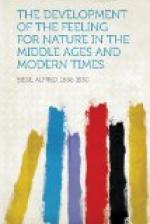The chief mark of both epochs was individualism, the discovery of the individual. In Hellenism it was the barriers of race and position which fell; in the Renaissance, the veil, woven of mysticism and delusion, which had obscured mediaeval faith, thought, and feeling. Every man recognized himself to be an independent unit of church, state, people, corporation—of all those bodies in which in the Middle Ages he had been entirely merged.
Monarchical institutions arose in Hellenism; but the individual was no longer content to serve them only as one among many; he must needs develop his own powers. Private affairs began to preponderate over public; the very physiognomy of the race shewed an individual stamp.
After the time of Alexander the Great, portrait shewed most marked individuality. Those of the previous period had a certain uniform expression; one would have looked in vain among them for the diversities in contemporary types shewn by comparing Alexander’s vivid face full of stormy energy, Menander’s with its peculiar look of irony, and the elaborate savant-physiognomy of Aristotle. (HELBIG.)
And Burckhardt says:
At the close of the thirteenth century Italy began to swarm with individuality; the charm laid upon human personality was dissolved, and a thousand figures meet us each in its own special shape and dress.... Despotism, as we have already seen, fostered in the highest degree the individuality, not only of the tyrant or Condottiere himself, but also of the men whom he protected or used as his tools—the secretary, minister, poet, or companion.
Political indifference brought about a high degree of cosmopolitanism, especially among those who were banished. ’My country is the whole world,’ said Dante; and Ghiberti: ’Only he who has learned everything is nowhere a stranger; robbed of his fortune and without friends, he is yet a citizen of every country, and can fearlessly despise the changes of fortune.’
In both Hellenism and the Renaissance, an effort was made in art and science to see things as they really were. In art, detail was industriously cultivated; but its naturalism, especially as to undraped figures, was due to a sensuous refinement of gallantry and erotic feeling. The sensuous flourished no less in Greek times than in those of Boccaccio; but the most characteristic peculiarity of Hellenism was its intentional revelling in feeling—its sentimentality. There was a trace of melancholy upon many faces of the time, and unhappy love in endless variations was the poet’s main theme. Petrarch’s lyre was tuned to the same key; a melancholy delight in grief was the constant burden of his song.
In Greece the sight of foreign lands had furthered the natural sciences, especially geography, astronomy, zoology, and botany; and the striving for universality at the Renaissance, which was as much a part of its individualism as its passion for fame, was aided by the widening of the physical and mental horizons through the Crusades and voyages of discovery. Dante was not only the greatest poet of his time, but an astronomer; Petrarch was geographer and cartographer, and, at the end of the fifteenth century, with Paolo Toscanelli, Lucca Baccioli, and Leonardo da Vinci, Italy was beyond all comparison the first nation in Europe in mathematics and natural science.




